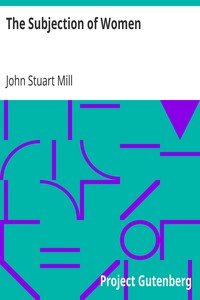The Subjection of Women by John Stuart Mill
"The Subjection of Women" by John Stuart Mill is an essay published in 1869, developed jointly with his wife Harriet Taylor Mill. At a time when European society viewed women as naturally inferior and properly subordinate to men, Mill challenged the foundations of gender inequality. He argued that claims about women's natural limitations were baseless speculation, since women had never been allowed to prove their capabilities under conditions of equality. Mill contended
that liberating half the human population would benefit not only individual women but all of society. (This is an automatically generated summary.)
Read or download for free
| How to read | Url | Size | |||
|---|---|---|---|---|---|
| Read now! | https://www.gutenberg.org/ebooks/27083.html.images | 291 kB | |||
| EPUB3 (E-readers incl. Send-to-Kindle) | https://www.gutenberg.org/ebooks/27083.epub3.images | 183 kB | |||
| EPUB (older E-readers) | https://www.gutenberg.org/ebooks/27083.epub.images | 184 kB | |||
| EPUB (no images, older E-readers) | https://www.gutenberg.org/ebooks/27083.epub.noimages | 175 kB | |||
| Kindle | https://www.gutenberg.org/ebooks/27083.kf8.images | 335 kB | |||
| older Kindles | https://www.gutenberg.org/ebooks/27083.kindle.images | 312 kB | |||
| Plain Text UTF-8 | https://www.gutenberg.org/ebooks/27083.txt.utf-8 | 272 kB | |||
| Download HTML (zip) | https://www.gutenberg.org/cache/epub/27083/pg27083-h.zip | 175 kB | |||
| There may be more files related to this item. | |||||
Similar Books
About this eBook
| Author | Mill, John Stuart, 1806-1873 |
|---|---|
| Title | The Subjection of Women |
| Note | Wikipedia page about this book: en.wikipedia.org/wiki/The_Subjection_of_Women |
| Credits |
Produced by Michael Roe and the Online Distributed Proofreading Team at www.pgdp.net (This file was produced from images generously made available by The Internet Archive/American Libraries.) |
| Reading Level | Reading ease score: 42.9 (College-level). Difficult to read. |
| Language | English |
| LoC Class | HQ: Social sciences: The family, Marriage, Sex and Gender |
| Subject | Women -- Social and moral questions |
| Subject | Women's rights |
| Category | Text |
| EBook-No. | 27083 |
| Release Date | Oct 28, 2008 |
| Most Recently Updated | Jan 25, 2021 |
| Copyright Status | Public domain in the USA. |
| Downloads | 3138 downloads in the last 30 days. |
| Project Gutenberg eBooks are always free! | |

